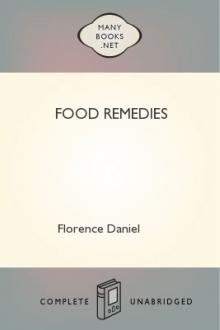The Chemistry of Food and Nutrition, A. W. Duncan [i love reading .txt] 📗

- Author: A. W. Duncan
- Performer: -
Book online «The Chemistry of Food and Nutrition, A. W. Duncan [i love reading .txt] 📗». Author A. W. Duncan
There are on record certain experiments which appear to indicate the necessity of a large proportion of proteid, especially when the diet has been of vegetable origin. These experiments are inconclusive, because the subject has been accustomed to an ordinary flesh diet, perhaps also to alcoholic drinks. The change to a comparatively non-stimulating diet cannot be made, and the digestive organs expected to adapt themselves in a few days. Perhaps not even a month or a year would suffice, for some people, and yet that same diet would suit others. In some experiments the food has not been appetising, the subject has even taken it with reluctance or even loathing; an excess of some food has been eaten which no vegetarian or anybody else would think of using in a practical dietary.
Sometimes persons on changing from an ordinary flesh dietary, lose weight and strength. Generally, it is found that they have done little more than discontinue the flesh, without substituting suitable foods. Authorities think it is from a deficiency of proteid, and recommend an addition of such foods as pulse, wheatmeal, oatmeal, eggs, milk, cheese, and such as a reference to the table of analyses, show a low nutrient ratio figure. This may also be due to an insufficiency of food eaten, owing to the comparatively insipid character of the food and want of appetite. In making a change to a vegetarian diet, such foods had better be taken that are rather rich in proteid, and that approximate somewhat in their flavour and manner of cooking to that used previously. A further change to a simpler diet can afterwards gradually be made, according to conviction, tastes and bodily adaptability. It must not be expected that a change, even an ultimately very advantageous one, will always meet with an immediate and proper response from digestive and assimilative organs which have been accustomed for many years, perhaps by inheritance for generations, to another manner of living. There are several preparations produced from centrifugalised milk—that is milk from which the butter fat has been removed, which consist chiefly of proteid. These have a value in increasing the proteid contents of foods which may be thought deficient. The addition of these manufactured products appear unnecessary, as most of our food contains an abundance of proteid, and we can easily limit the quantity or avoid altogether those that are thought defective.
The later apologists for a flesh diet have had to admit that it is not a physiological necessity; but they have attempted to justify its use by a theory somewhat as follows. It is admitted, that any excess of proteid over that necessary for its special province of producing tissue, is utilised as a force-producer, in a similar manner to the carbo-hydrates. When the molecule is split up, and the carbon utilised, the nitrogen passes off in the form of urea by the kidneys. The theory propounded is that at the moment the nitrogen portion is liberated, it in some manner stimulates the living protoplasm of the nerve cells in its immediate neighbourhood to a higher state of activity. These views are given by Dr. Hutchison in his book on "Food," but there are no substantial grounds for them. It is only prompted by a wish to excuse a cherished habit. Sir William Roberts, M.D., in "Dietetics and Dyspepsia," p. 16 says that "high feeding consists mainly in a liberal allowance of meat, and in the systematic use of alcoholic beverages, and that low-feeding consists in a diet which is mainly vegetarian and non-alcoholic," and he proceeds to say that the high-fed classes and races display, on the whole, a richer vitality and a greater brain-power than their low-fed brethren. That "it is remarkable how often we hear of eminent men being troubled with gout, and gout is usually produced either by personal or ancestral high-feeding." We can only spare room for a few remarks on this subject. Intellectual and business ability brings wealth, wealth frequently leads to the pleasures of the table, but such habits are detrimental to sustained effort and clearness of mind. The children and grandchildren of such high livers are usually common-place, intellectually, and of deteriorated physique. The aristocracy who are generally high livers, notwithstanding their great advantages of education, travel and leisure, are not as a rule famed for their intellectual gifts. In the recent war the frugal living Japanese soldier has proved himself the most enduring and bravest in history; whilst the Japanese officers are more resourceful and tactful than the wealthier, high-fed Russian officers, with their aristocratic lineage. What is called high-feeding, is of the greatest benefit to the doctors and the proprietors of remedies for digestive and nervous disorders.
Food Adjuncts and Drugs.—In addition to the nutrients and the small quantity of indigestible fibre of which we have already written, food generally contains small quantities of substances which are difficult to classify, and whose action on the body is but imperfectly understood. Many of these possess pungent or strong odours and flavours. To them, various fruits, meats, etc., owe much of their characteristic differences of taste. When pure the proteids and starches are devoid of taste. Such oils and fats as are generally eaten have also but little flavour, providing they are free from rancidity and of good quality. The sugars differ from the other nutrients in possessing a more or less decided taste. The free vegetable acids also strongly affect the sense of taste, but they are only consumed in small quantities.
A drug may be defined as a substance which modifies the functions of the body or of some organ without sensibly imparting nourishment. This action may be one of stimulation or of depression. A drug is taken for its medicinal action, a food adjunct for its modifying action on food. It is impossible to give a quite satisfactory definition, or to draw sharp distinctions. For example, tea, coffee, alcohol and tobacco are sometimes placed in one group, and sometimes in another, according to opinion of their action and the definition of the terms food adjuncts, drugs and poisons. The difference of grouping often depends upon intensity rather than of kind of action. If taken frequently and not in quantity sufficient to have a markedly medicinal action, such things are generally called food adjuncts or supplementary foods, although much may be said in favour of a different view. The volatile oils of mustard, caraway, cloves, etc., are used in medicine; also the alkaloids of coffee and cocoa. Even honey is used as a mild laxative for infants; that is, as a drug. The difference between a drug and a poison is one only of degree. Some of the most esteemed drugs have to be administered in very small quantities, or they cause death; e.g., strychnine and morphine.
Classifications are necessary for methodical study, and for assisting the memory in grasping large numbers of things which can be grouped together. Classifications, however, are artificial, not due to natural lines of demarkation, but according to man's knowledge and convenience; hence a group is apt to approach and finally merge into another group, although on first consideration they appeared quite distinct. The disregard of this often leads to confusion and useless discussions.
Plants, like animals, as the result of tissue change, have certain used-up or waste matters to get out of the way. Animals have special excretory organs for the purpose; waste matter remains in the flesh and blood of dead animals. In plants are found a large number of powerful volatile oils, alkaloids, bitter resins, etc. Many of these are, in all probability, excretory products of no assimilative value to the plant. Certain volatile oils may attract insects, and in obtaining nectar from flowers insects assist fertilisation. Agreeable volatile oils and flavouring substances in fruits attract birds and animals. The eating of the fruits cause the seeds, which are uninjured by passing through the digestive system, to be disseminated over wide areas to the advantage of the plant species. On the other hand, nauseous and poisonous alkaloids, oils, resins, etc., serve as a protection against the attacks of browsing animals, birds, caterpillars, snails, etc. These nauseous substances are most abundant in the bark, husk, skin and outer parts. It is commonly supposed that the food on which each animal, including man, subsists, is especially produced by Nature for the purpose. This is an error, for each species of plant and animal lives for itself alone, and protects itself, with more or less success, against destruction by its competitors and enemies. Each species of animal selects from its surroundings such food as is most suitable. Such food may not be theoretically perfect; that is, it may not contain the maximum of nourishment free from innutritious matter; but during the long period of evolution, each species of animal has become possessed of organs suited to its environment. If to such animals be given food containing less indigestible matter, or food which is more readily digested by laboratory tests made independently of the living animal, their digestive system will be thrown out of gear, become clogged up or refuse to work properly, just as the furnace of a steam boiler, made to burn coal, will act badly with wood or petroleum. Many scientific men have overlooked this fact, and have endeavoured to produce food substances for general consumption, in the most concentrated and soluble form, thinking such food would be more easily assimilated.
The Volatile and Essential Oils are contained in minute quantity in a very large number of animal and vegetable foods. They contribute in part to the flavour of fruits. They are the cause of the pungency and aroma of mustard, horse-radish, cloves, nutmegs, cinnamon, caraway seeds, mint, sage and other spices. Onions contain a notable quantity. When extracted the essential oils become powerful drugs. In moderate quantities they are stomachic and carminative, in larger quantities irritant and emetic. Condiments and spices not only add flavour to food, but stimulate the secretion of gastric juice and peristaltic movement.
The Alkaloids most used are those of tea, coffee, kola-nut, cocoa, coca, tobacco and opium. Although the two last are generally smoked, they must be classed amongst the food adjuncts. It is of little consequence whether their active principles enter the body by the mouth and saliva or the lungs; their action on the blood and nervous system is the same.
The Extractives, as they are called, comprise a number of bodies of varying nature. They especially exist in flesh and flesh extracts. Amongst these are the purins. They will be treated at greater length hereafter.
Alcohol is to some extent a true food, but its stimulant and other action quite overshadows any food value it may possess.
There are other bodies such as the resins and bitters. The active principle of Indian hemp is a resin.
There is a great difference of opinion as to the extent to which stimulants may advantageously be used. It is remarkable that amongst nearly all nations, either alcohol in some form or one of the stronger alkaloids is in common use. From this fact it is sometimes argued that stimulants must supply a physiological need. The same method of reasoning will apply with greater force to the use of condiments. Such conclusions appear to us to be scarcely warranted.





Comments (0)